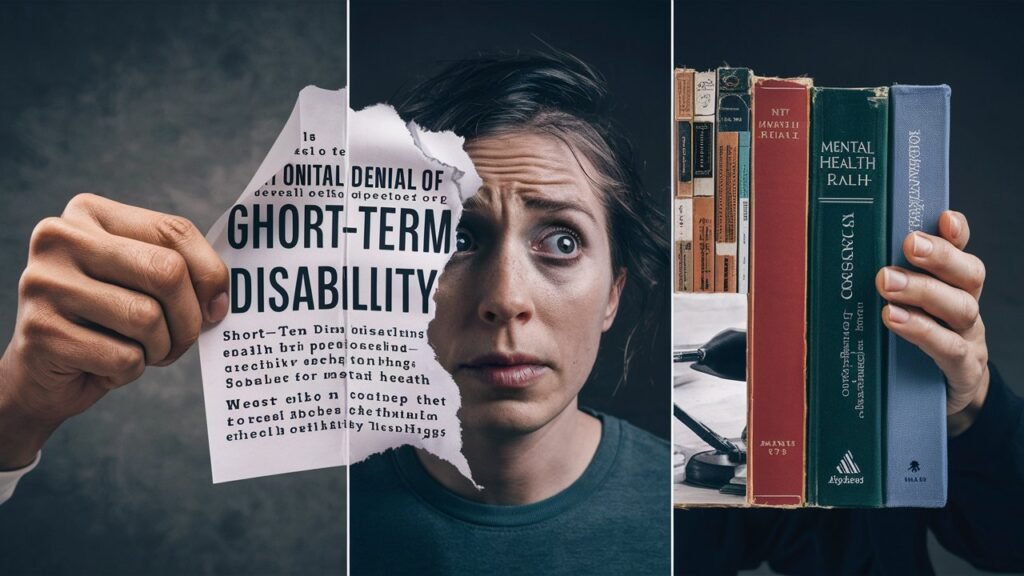In recent years, there has been a growing recognition of the importance of mental health and its impact on overall well-being. However, when it comes to short-term disability (STD) claims, mental health issues often face a unique set of challenges. This comprehensive article aims to delve into the intricacies of whether short-term disability can be denied for mental health reasons, providing valuable health tips, addressing frequently asked questions, and concluding with key takeaways.

Understanding Short-Term Disability and Mental Health
What is Short-Term Disability?
Short-term disability insurance is designed to provide income replacement for individuals who are temporarily unable to work due to a medical condition. This can include a wide range of physical illnesses and injuries, as well as mental health conditions. The goal of STD is to offer financial support during the recovery period, allowing individuals to focus on their health without the added stress of lost wages.
The Importance of Mental Health in the Workplace
Mental health conditions, such as depression, anxiety, and stress-related disorders, can be just as debilitating as physical ailments. They can significantly impact an individual’s ability to perform their job, maintain relationships, and enjoy a good quality of life. Despite this, mental health conditions often face stigma and misunderstanding, which can affect the approval of disability claims.
Can Short-Term Disability Be Denied for Mental Health?
Legal and Policy Considerations
- Policy Coverage: Not all short-term disability policies explicitly cover mental health conditions. It’s crucial to review the terms and conditions of your policy to understand what is covered. Some policies may exclude mental health issues altogether, while others may have specific requirements or limitations.
- Documentation and Evidence: The approval of a short-term disability claim often hinges on the documentation and evidence provided. For mental health claims, this typically includes detailed medical records, a diagnosis from a qualified mental health professional, and evidence of how the condition impairs your ability to work.
- Subjectivity and Bias: Mental health conditions can be more subjective compared to physical injuries, making them harder to quantify and prove. This subjectivity can lead to biases in the evaluation process, potentially resulting in denials.
Common Reasons for Denial
- Insufficient Documentation: One of the most common reasons for denial is the lack of adequate medical documentation. Providing comprehensive records, including treatment plans, progress notes, and letters from healthcare providers, is essential.
- Non-Specific Diagnoses: Claims can be denied if the diagnosis is vague or not recognized as a disabling condition by the insurance company. Clear and specific diagnoses, such as major depressive disorder or generalized anxiety disorder, are more likely to be considered.
- Perceived Malingering: Insurers may be skeptical of mental health claims due to concerns about malingering, where individuals exaggerate or fabricate symptoms. Demonstrating a consistent treatment history and adherence to prescribed therapies can help counteract these suspicions.
Appeals and Legal Recourse
If your short-term disability claim for mental health reasons is denied, you have the right to appeal the decision. Here are some steps to take:
- Review the Denial Letter: Understand the specific reasons for the denial and gather additional evidence or documentation to address these concerns.
- Consult with a Mental Health Professional: Obtain a comprehensive evaluation and additional supporting documentation from your mental health provider.
- Legal Assistance: Consider consulting with an attorney who specializes in disability claims. They can provide guidance on the appeals process and represent your case if necessary.
Health Tips for Managing Mental Health
Maintaining Mental Well-being
- Regular Exercise: Physical activity has been shown to improve mood and reduce symptoms of depression and anxiety. Aim for at least 30 minutes of moderate exercise most days of the week.
- Healthy Diet: Eating a balanced diet rich in fruits, vegetables, lean proteins, and whole grains can positively impact your mental health. Avoid excessive caffeine, sugar, and processed foods.
- Adequate Sleep: Prioritize getting 7-9 hours of quality sleep each night. Poor sleep can exacerbate mental health issues, making it harder to manage daily stressors.
- Mindfulness and Meditation: Practicing mindfulness and meditation can help reduce stress and improve emotional regulation. Apps like Headspace and Calm offer guided sessions for beginners.
- Social Connections: Maintaining strong social connections with friends, family, and support groups can provide emotional support and reduce feelings of isolation.

Seeking Professional Help
- Therapy: Various forms of therapy, such as cognitive-behavioral therapy (CBT), dialectical behavior therapy (DBT), and psychodynamic therapy, can be effective in treating mental health conditions.
- Medication: In some cases, medication may be necessary to manage symptoms. Consult with a psychiatrist to explore your options and find the right medication and dosage.
- Support Groups: Joining support groups for individuals with similar conditions can provide a sense of community and practical advice for coping with mental health challenges.
- Crisis Resources: If you are in crisis, do not hesitate to seek immediate help. Resources such as the National Suicide Prevention Lifeline (1-800-273-8255) are available 24/7.
Frequently Asked Questions (FAQs)
1. Can short-term disability be denied for anxiety?
Yes, short-term disability can be denied for anxiety if the insurance company does not receive sufficient documentation or if the policy does not cover mental health conditions. Providing thorough medical records and a clear diagnosis can improve the chances of approval.
2. How do I prove my mental health condition for short-term disability?
To prove your mental health condition, you should provide comprehensive documentation, including:
- Detailed medical records
- A diagnosis from a licensed mental health professional
- Evidence of treatment plans and adherence
- Letters from healthcare providers explaining the impact of your condition on your ability to work
3. What can I do if my short-term disability claim is denied?
If your claim is denied, you can:
- Review the denial letter to understand the reasons
- Gather additional evidence or documentation
- Consult with your mental health provider for more support
- Consider hiring an attorney who specializes in disability claims for guidance and representation during the appeals process
4. Are there specific mental health conditions that are more likely to be approved for short-term disability?
Conditions with clear diagnostic criteria and substantial impact on daily functioning, such as major depressive disorder, bipolar disorder, and severe anxiety disorders, are more likely to be approved. However, each case is evaluated individually.
5. How long can I receive short-term disability benefits for mental health reasons?
The duration of benefits varies by policy. Typically, short-term disability benefits last from a few weeks up to six months. Review your policy for specific details.
6. Can I apply for long-term disability if my mental health condition persists?
Yes, if your mental health condition persists and prevents you from working beyond the period covered by short-term disability, you may be eligible for long-term disability (LTD) benefits. The application process for LTD is separate and may require additional documentation.
Conclusion
Navigating the process of obtaining short-term disability benefits for mental health conditions can be challenging. While there are hurdles to overcome, understanding your policy, providing thorough documentation, and seeking professional assistance can increase your chances of approval. Remember that mental health is just as important as physical health, and taking the necessary steps to manage your well-being is crucial. If your claim is denied, don’t be discouraged—there are avenues for appeal and legal recourse to ensure you receive the support you need.




